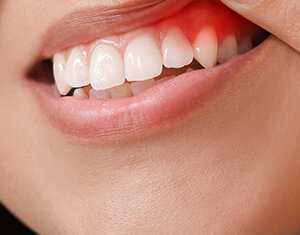Blog
Struggling With Bad Breath? Stop Eating These Foods and Beverages
Oral Care

About half of the global population encounters "halitosis," or unpleasant breath. Residual mouth bacteria from consumed food can produce disagreeable odours if not eliminated. Certain foods, such as garlic and onions, contain aromatic oils that travel through the bloodstream. Ultimately, these oils reach the lungs, and you exhale them while speaking. Fortunately, some foods counteract bad breath.
Chances are, you already incorporate some of these breath-freshening foods into your diet, making it effortless to use them as remedies for bad breath. Make sure to select your favourites from the list below for immediate relief.
In this post, you will also learn about the foods and beverages you must avoid to combat bad breath.
What is Bad Breath?
Medically referred to as halitosis, bad breath is identified by the presence of an unpleasant odour in the exhaled breath. While it often occurs upon waking in the morning, it can manifest anytime during the day. If you consistently encounter persistent bad breath throughout the day, it is essential to reassess your oral hygiene practices.
Top Foods That Help to Fight Dental Odour Problems
Green Tea
Picture this: you're in a crucial business meeting during lunch when you suddenly become aware of your less-than-pleasant breath. There is no need to panic. There are swift and straightforward naturalremedies for bad breath to promptly alleviate bad breath, allowing you to concentrate on more pressing matters.
Apples
Munching on crisp fruits and vegetables can stimulate saliva production, effectively rinsing away bacteria responsible for unpleasant odours and preventing dry mouth. Moreover, biting into an apple is a bonus by assisting in bad breath cure and removing potential food particles contributing to bad breath. Keep an apple within reach at your desk or toss one into your bag for a convenient and speedy breath freshener whenever needed.
Oranges or Lemons
Are you dealing with morning breath? Consider adding a splash of lemon juice to a glass of water and consuming it as the first thing upon waking up as remedies for bad breath. When dining out, grab a lemon wedge to chew on, or keep an orange in your bag or at the office for a quick, breath-refreshing snack in case of emergencies. The vitamin C content and enhanced saliva production from the citrus can swiftly contribute to bad breath remedies.
Water
Water might not be perceived as a typical food, and you might be uncertain about its effectiveness in combating bad breath, but it stands out as the safest bad breath treatment for addressing this issue. Opting for plain water throughout the day poses no risk of promoting cavities. Dry mouth presents a significant risk for oral health issues, including bad breath. Maintaining oral hydration guards against cavities and helps alleviate bad breath.
Why Do Some Foods Cause Bad Breath?
The consumption of any food can influence the breath. Food remnants can adhere to our teeth and tongue as we eat, creating a feeding ground for the bacteria in our mouths. When these bacteria metabolise food, particularly carbohydrates, they generate acids that emit an odour.
Additionally, pungent foods can contribute to bad breath when their compounds enter the bloodstream. However, enjoying flavourful foods doesn't necessitate avoidance due to their impact on breath. Products and habits are available to help refresh your breath after a meal.
Garlic, Onions, and Spicy Foods
Numerous spicy foods, such as chiles, peppers, and spices, have the potential to cause bad breath. Additionally, garlic and onions can linger well after the meal is concluded. Upon digestion, the chemicals from garlic and onions enter your bloodstream, make their way to your lungs, and are subsequently exhaled during breathing!
Coffee and Alcoholic Beverages
Beverages containing caffeine and alcohol tend to induce dry mouth. While dry mouth commonly occurs during sleep, resulting in "morning breath," consuming beverages that contribute to mouth dryness can lead to bad breath at any time throughout the day.
Conclusion
Keep in mind that bad breath remedies involve proper oral care routinethat can keep your breath smelling fresh, even when indulging in aromatic foods and beverages. Brushing your teeth a minimum of twice daily or after meals aids in the removal of food debris and bacteria.
Supplementing this bad breath treatment with cleaning between your teeth using floss, water flossers, or interdental brushes and incorporating oil pulling with products like Dabur Red Pulling Oil ensures consistently fresh breath. Also, make it a habit to fight bad breath by brushing daily with natural and Ayurvedic ingredients-based toothpastes like Dabur Red Paste. It contains essential oils, camphor, clove, etc., that make your breath clean and fresh.
FAQs
Why do I have bad breath every day?
Failure to brush and floss daily allows food particles to linger in your mouth, leading to unpleasant breath. A transparent, adhesive layer of bacteria, known as plaque, develops on your teeth. When left unaddressed, plaque can agitate your gums and eventually give rise to pockets filled with plaque between your teeth and gums, a condition known as periodontitis.
What fruit is good for bad breath?
Berries, melons, and citrus fruits boast high levels of Vitamin C, a nutrient that impedes the thriving of odour-causing bacteria. Additionally, these fruits are rich in water content, contributing to well-hydrated and odour-free oral conditions.
Can salt water cure bad breath?
The traditional warm water and salt mix isn't just for soothing a sore throat—it can also tackle bad breath. Gargling with warm salt water aids in the elimination of mucus and bacteria from the throat's back, and acts as one of the best remedies for bad breath.
Disclaimer: The contents of this article are for informational purposes only and not a substitute for medical advice.























